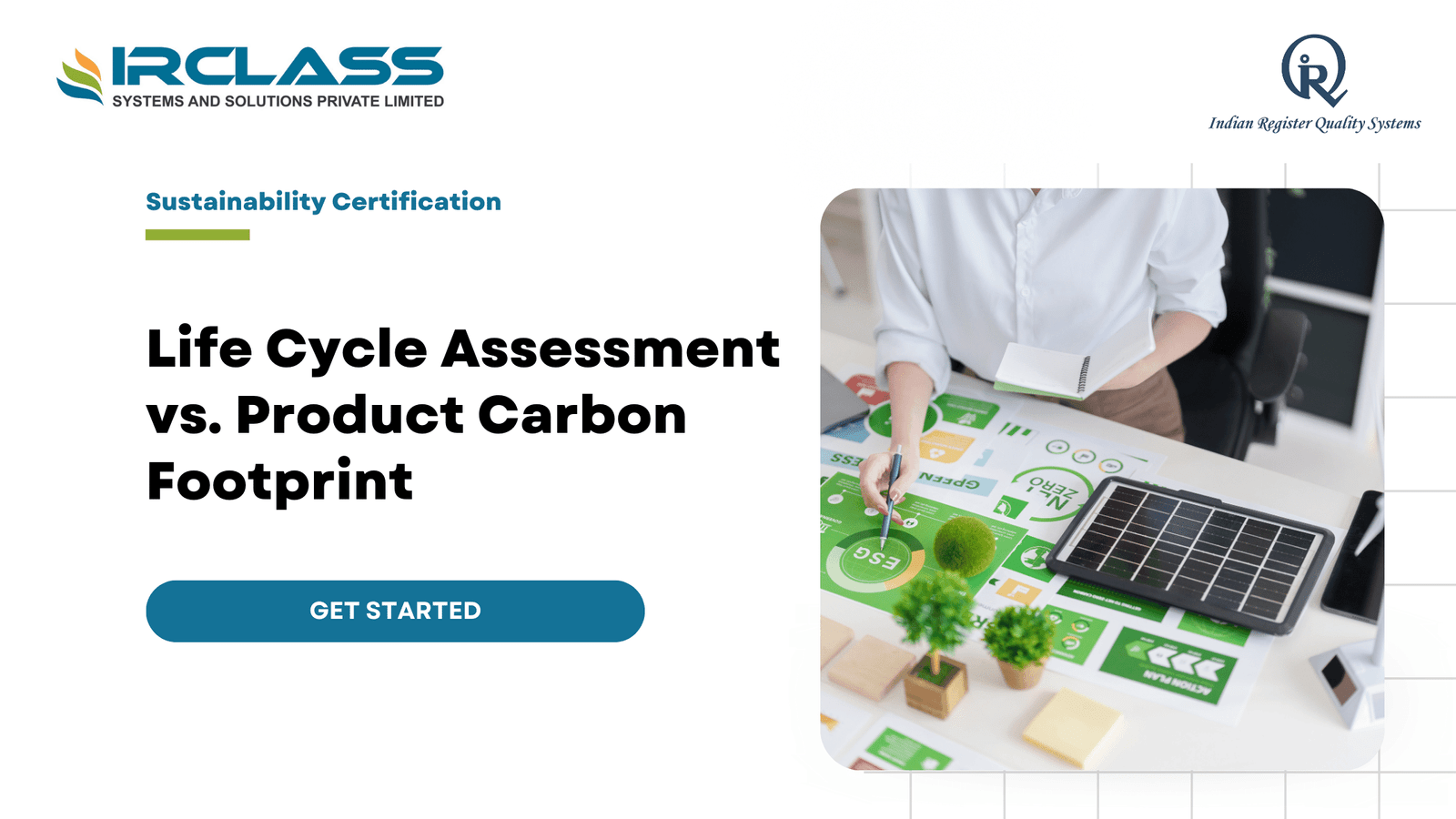Category: ESG Certification
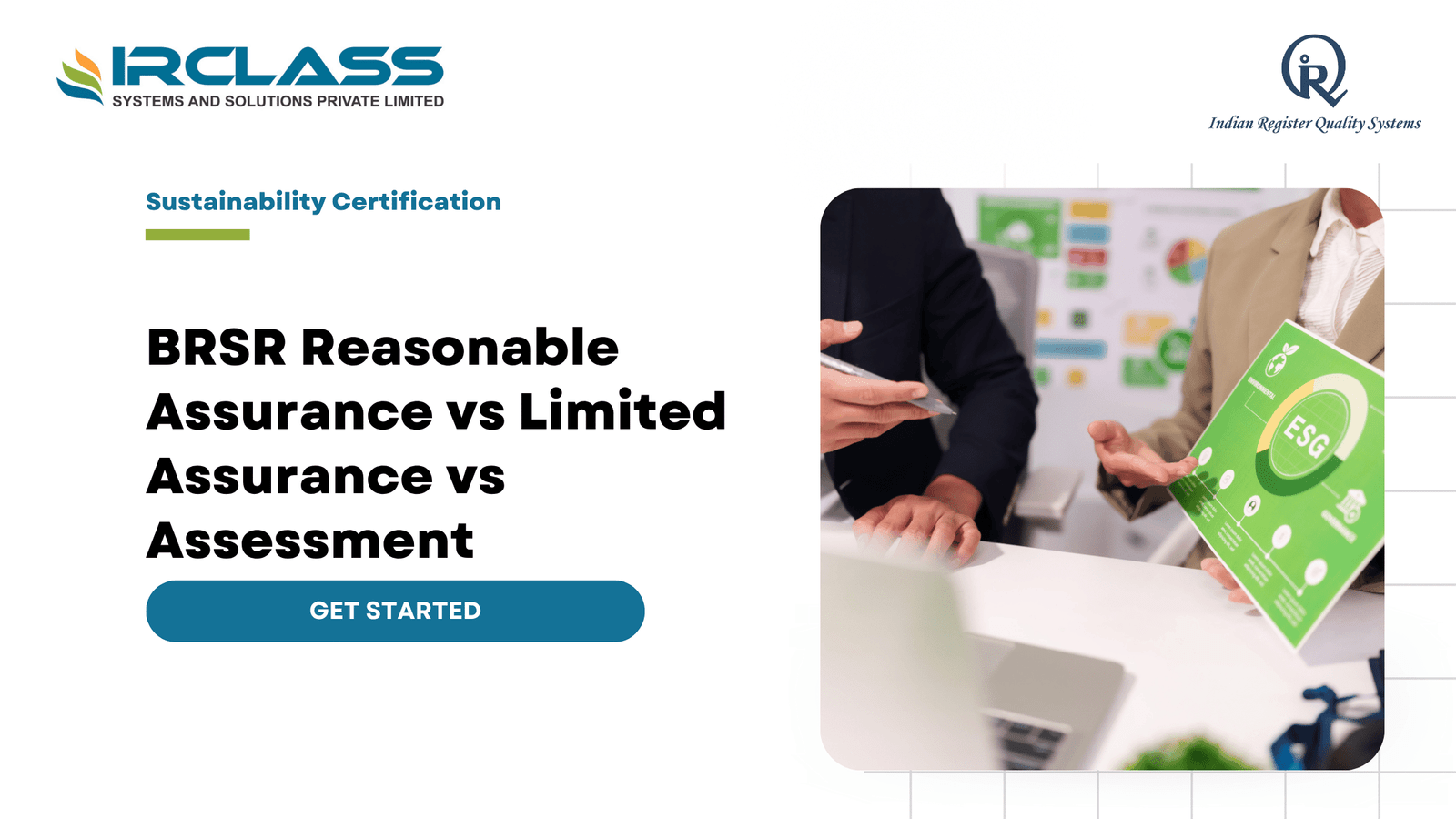
BRSR Reasonable Assurance vs Limited Assurance vs Assessment
Companies in India are now reporting ESG data not just for compliance but also for trust and clarity. The BRSR framework makes this process more formal through defined indicators along with a push for third-party assurance. For listed companies, the difference between an internal review and an external opinion is now part of regulatory expectations. Knowing how assessment works along with how limited and reasonable assurance compare is the first step to preparing your ESG report the right way. Why assurance matters in ESG reporting Assurance brings structure to how companies report non-financial data. It helps confirm that the data is correct along with consistent across time periods and reporting boundaries. The SEBI BRSR Core framework makes assurance mandatory for certain ESG indicators. This rule will apply to the top 1,000 companies in India by financial year 2026–27. That means your team needs to move from internal tracking to verified reports that others can rely on. What assessment means and what it covers ESG assessment is usually conducted at the initial stage of reporting. It assists in mapping the most important things as well as missing data. The company can do this on its own or through a consulting partner. Assessment assists in developing the report, but not the degree of review that is associated with assurance. It is useful in preparation and planning but is not considered as formal validation under BRSR. How limited assurance works Limited assurance is a third-party review that checks if the report contains major issues or clear mistakes. It relies on small samples along with interviews and does not go very deep. The final opinion is usually written as a negative statement. It says that no material misstatements were found but does not confirm full accuracy. Limited assurance is common in early-stage ESG reporting or when regulations do not ask for full verification. What reasonable assurance includes Reasonable assurance is a deeper and more structured review. The third party tests the company’s systems along with the data and the process behind it. They look at how the company collects information and whether it can be traced to a valid source. This level of assurance ends with a positive statement which confirms that the data is accurate based on the review. It is the only level accepted for the mandatory BRSR Core indicators under SEBI’s rule. SEBI’s assurance timeline SEBI has introduced a clear path for how companies will move into reasonable assurance. The indicators covered include emissions, energy, water, waste, safety, workforce and other core metrics that can be verified through data. What companies need to be ready Reasonable assurance cannot be done in a rush. Your company needs strong records along with consistent reporting systems. Every ESG metric should have a clear owner and a method that can be reviewed. You also need to know which KPIs are required and whether the data is available across your operations and value chain. Any gaps should be fixed before the review begins. Where GRI reporting supports assurance GRI is a voluntary reporting system but it offers a structured way to manage ESG data. It helps define what matters and builds a path to deeper reporting. Since SEBI’s BRSR Core is now mandatory, GRI can help support the process by offering detail, clarity and context. The GRI and BSE mapping document also shows which GRI indicators match BRSR disclosures. Using both together helps create a report that is easier to assure. How companies are using both GRI and BRSR Many companies now use GRI to build out the full report and meet global stakeholder needs. They then use the BRSR Core as the base for compliance. GRI adds materiality along with narrative and policy detail which helps support the assurance process. This approach reduces confusion and gives companies a way to meet local rules and global expectations without writing two separate reports. Key differences between the three levels Review Type Done By Depth of Review Accepted for BRSR Core Assessment Internal or advisory firm High-level scan of data and gaps No Limited Assurance Independent third party Surface-level testing with limited scope No Reasonable Assurance Independent third party Deep testing of data and controls Yes Steps to prepare for reasonable assurance • Check which BRSR Core KPIs need assurance and map them to your internal data • Assign owners across departments to manage data sources and tracking • Use mock audits to check whether data is traceable and policy support is clear • Apply GRI to add structure and consistency across topics and metrics • Work with your assurance partner early to avoid issues during final review Why this shift matters now Assurance is no longer optional for many companies in India. Investors along with regulators, want ESG data that can be trusted. Limited assurance may work for general reportin,g but will not meet the standard now required under BRSR Core. Companies that wait too long to prepare may face last-minute pressure or risk non-compliance. How Indian Register Quality Systems can support your team Indian Register Quality Systems works with companies that need support across all three levels. Whether you are building your first ESG report or preparing for reasonable assurance, our team helps you move step by step. With clear planning and careful delivery, we help you meet SEBI requirements without added confusion or wasted time. FAQs What is the difference between assessment and assurance in ESG reporting? Assessment helps you review ESG practices and identify gaps while assurance checks if your data is accurate and ready to meet external reporting rules. Does SEBI require limited assurance or reasonable assurance for BRSR Core? SEBI requires companies to obtain reasonable assurance for specific ESG indicators under BRSR Core and does not accept limited assurance for those metrics. Can a company use GRI reporting to support BRSR compliance? Yes, using GRI helps companies structure their ESG data and supports BRSR disclosures with clear topics along with globally recognised reporting standards. Who is required to follow BRSR Core
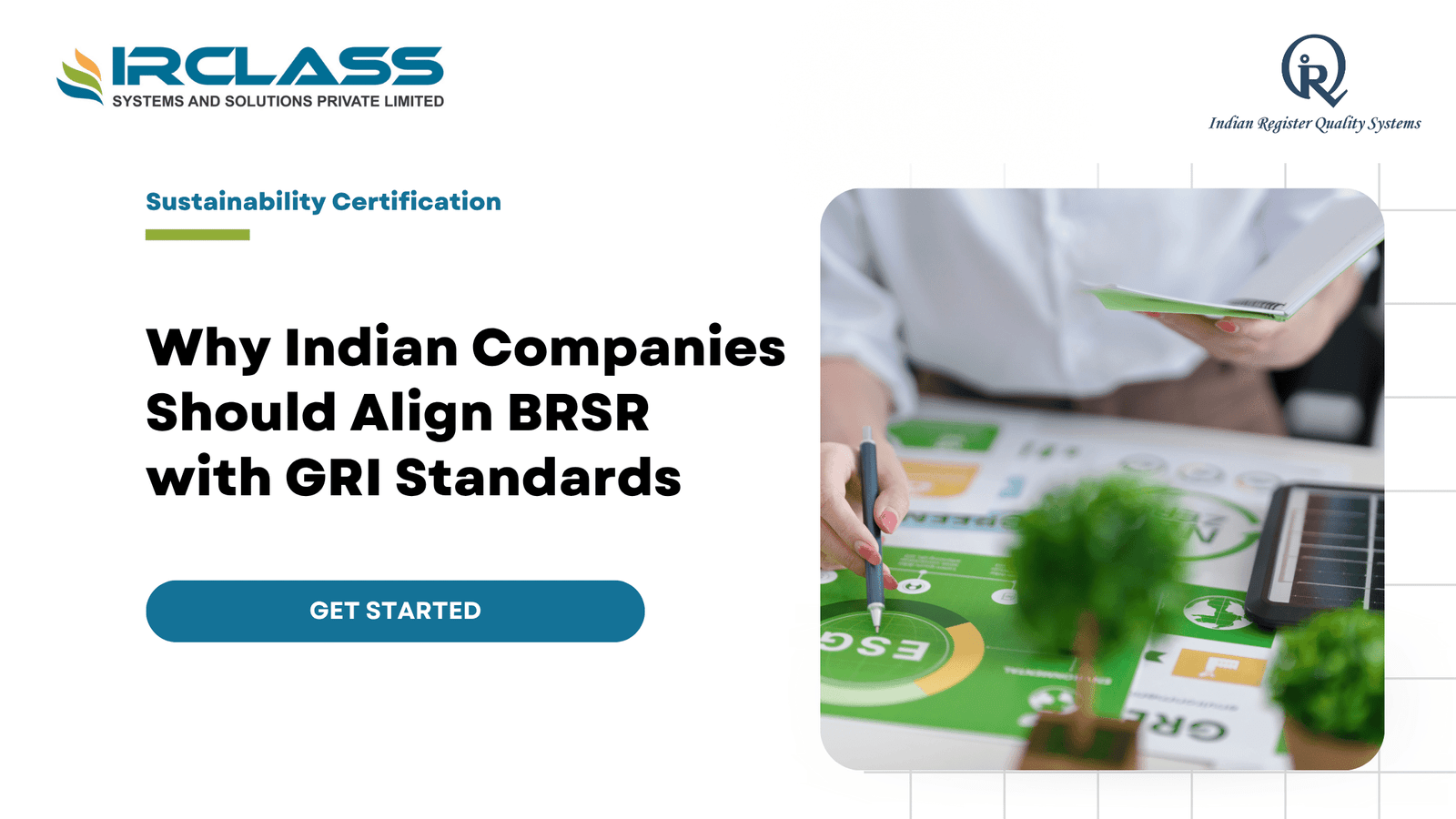
GRI Reporting and SEBI’s BRSR: Building Credible ESG Reports for Indian Companies
In India, more companies are paying attention to sustainability reporting due to the desire to demonstrate obvious evidence of the impact of their activity on people and the planet. It is no longer a formal requirement to report, as investors and regulators are requiring more transparency. The Global Reporting Initiative or GRI offers companies a chance to report their environmental, social, and governance data in a credible and organized format. Why GRI matters for Indian companies today GRI reporting assists companies in quantifying and report their ESG performance in a manner that is comprehensible by people. It provides organization to the data that would otherwise remain dispersed among departments. This is to produce one report that links the activities of an organization with their effects on society and the environment. This facilitates easier comparison of performance across time and sectors by the investors and customers. How SEBI’s BRSR changes the ESG reporting space The Securities and Exchange Board of India introduced the Business Responsibility and Sustainability Reporting framework, known as BRSR, to bring consistency to ESG reporting. This rule applies to the top one thousand listed companies by market capitalization. It requires companies to disclose ESG indicators that show how responsibly they manage environmental and social risks. While GRI is voluntary, BRSR is mandatory for these top companies. When used together, they form a system that covers both compliance and credibility. GRI and BRSR: how they connect in practice GRI and BRSR share similar goals but serve slightly different audiences. GRI gives a global view that supports comparison across countries along with sectors. BRSR focuses on India’s specific social and environmental priorities. The GRI Standards have been mapped against the BRSR indicators so that companies can prepare one report that satisfies both sets of requirements. This mapping was developed by GRI in partnership with the Bombay Stock Exchange to help Indian companies streamline their ESG work. Voluntary versus mandatory: what companies should understand GRI remains a voluntary framework that companies adopt to improve the quality of their ESG communication. The BRSR of SEBI, on the other hand, is compulsory to the leading listed companies in India. Those companies that integrate both strategies are able to fulfill the expectations of the national compliance and remain updated with the global investors. This balance assists them in reporting without having to repeat the same process under two different systems. Global versus local: how GRI and BRSR complement each other GRI supports global comparability because it follows internationally accepted standards. BRSR focuses on local social and governance needs that are specific to India. The key structure of GRI reporting GRI reporting follows a modular structure that includes Universal, Sector, and Topic Standards. Universal Standards form the foundation because they define the organization’s governance, values, and reporting process. Sector Standards address industry‑specific topics that vary from manufacturing to services. Topic Standards cover detailed ESG areas such as emissions, waste, and labor safety. This structure gives flexibility while keeping every report comparable and complete. Understanding SEBI’s BRSR Core requirements In 2023, SEBI published the BRSR Core to enhance the quality of ESG reporting. The BRSR Core has fewer key indicators that should be reported using verified data. These are greenhouse gas emissions, employee welfare, and value-chain disclosure. In the case of selected indicators, companies should seek reasonable assurance from an independent third party. By 2026-27, this assurance process will be mandatory for the leading companies. How companies can align GRI with BRSR Core The value of a materiality‑based approach GRI reporting is built around the idea of materiality, which means focusing on the issues that matter most. Companies start by identifying their actual and potential ESG impacts across their value chain. These are then ranked by significance and scope to decide which topics must be reported. The same logic supports BRSR because SEBI expects companies to share information that is relevant to their operations along with stakeholder interests. A materiality‑based report is easier to read and more useful for decision‑making. Why GRI makes BRSR reports stronger BRSR offers a well-organized list of indicators and does not necessarily leave room to elaborate. GRI bridges that gap by giving companies the opportunity to provide context and rationale to each disclosure. It provides room to outline strategy, policy and action plans in simple terms. This assists the stakeholders in not only knowing what a company has accomplished but also how it intends to enhance its performance. Combining GRI and BRSR will give a report that conveys both facts and intent. Benefits of GRI alignment for Indian companies The alignment with GRI will have a practical benefit to companies that already report under BRSR. It assists in enhancing internal data systems and encourages uniform data gathering within departments. It also establishes credibility among foreign investors and other global supply-chain partners who are aware of the GRI framework. Above all, it transforms ESG reporting into a long-term strategic instrument that contributes to growth and accountability. How GRI and BRSR reporting drive better ESG performance A feedback loop is established when both frameworks are used concurrently by companies. Information collected by BRSR assists in fulfilling local requirements, whereas GRI provides more insight into the performance patterns. This combination assists in the early identification of risks and demonstrates the areas of improvement. In the long run, it assists the management in establishing more robust sustainability objectives that are quantifiable and achievable. The strategy also equips businesses with the future changes in regulations as ESG reporting develops in markets. The path forward for ESG reporting in India With the increasing ESG demands, Indian companies will still be under pressure to report in a clear, credible, and comparable manner. GRI provides a platform that facilitates international presence. BRSR by SEBI makes all large companies accountable at home. The combination of the two frameworks offers a balanced approach that is suitable for both national regulations and global standards. Those who embrace both today will remain on the curve and be prepared to change in the
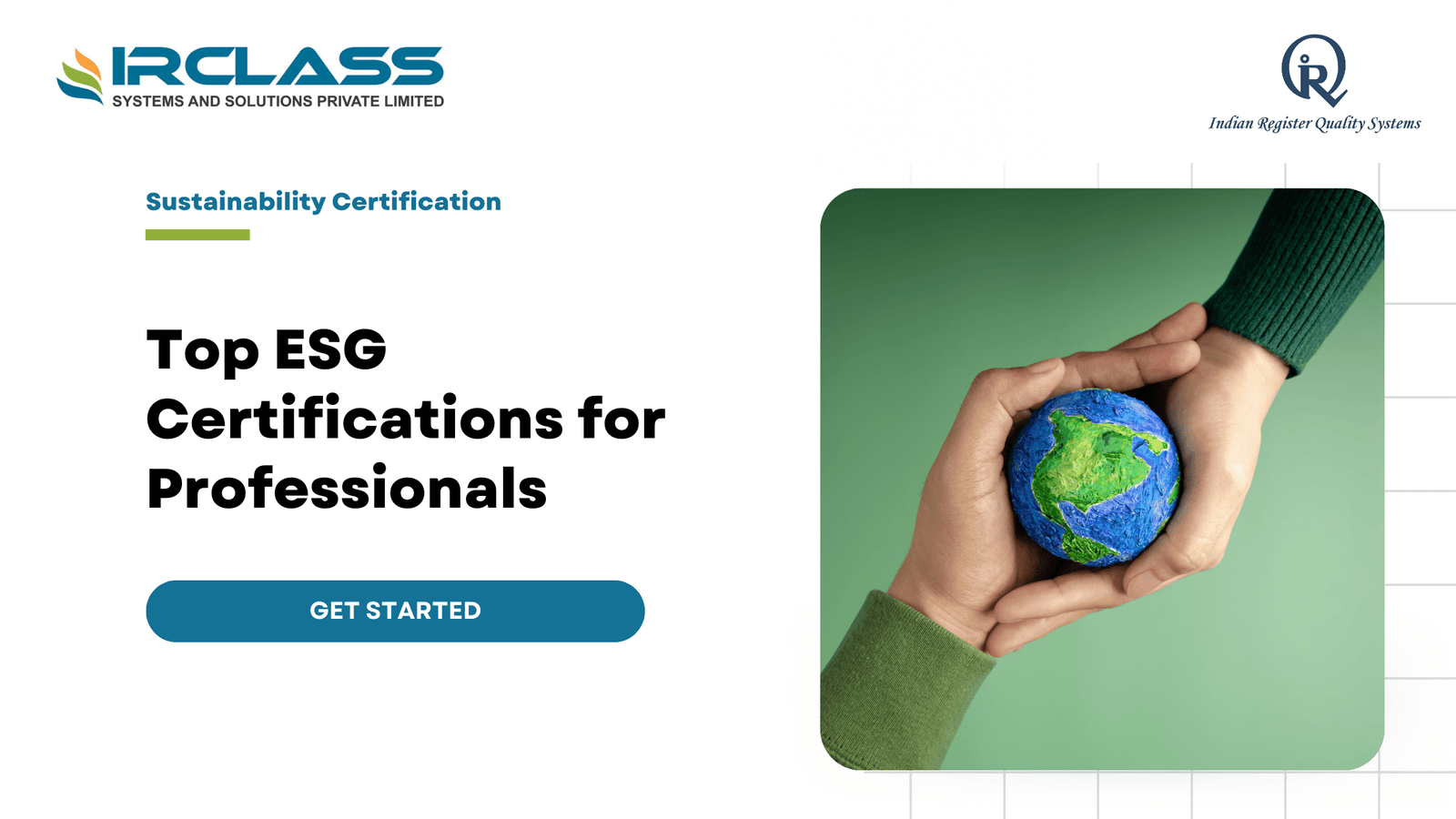
Top ESG Certifications for Finance, Sustainability, and Compliance Professionals
Finance, sustainability, and compliance are now deeply connected through ESG. Whether you’re managing risk, allocating capital, or aligning with regulations, ESG is part of your role. But ESG frameworks are complex. Investors want accurate disclosures. Regulators expect transparency. Boards demand strategy. Professionals need the right training to keep up, and that’s where ESG certifications matter. A good ESG certification teaches you how to interpret data, follow global standards, and apply ESG thinking to your daily work. Whether you’re building an investment model, conducting a sustainability audit, or writing a compliance report, the right certification helps you do it with accuracy and confidence. Why ESG Matters in Finance, Sustainability, and Compliance Each of these fields touches ESG in a different way. In finance, ESG influences credit ratings, valuations, and long-term investment decisions. In sustainability, it drives climate strategy, net-zero targets, and social impact. It is not about compliance; it is about aligning with international standards such as TCFD, GRI, and CSRD and avoiding greenwashing. Without proper ESG knowledge, even the best professionals make mistakes. They misread disclosures. They apply the wrong metrics. Or worse, they leave out key risks. ESG certifications reduce that gap by training people in standards, risk assessment, and data reporting. How ESG Certifications Support Different Roles In finance, certifications help you integrate ESG into models and portfolios. You learn how to assess climate risks, interpret sustainability disclosures, and apply ESG metrics in credit decisions. This is now critical for investors, lenders, and risk managers. In sustainability, certifications are more in-depth in terms of carbon accounting, supply chain risks, and stakeholder engagement. You get to know how to develop sustainability strategies that are compliant with regulations and investor demands. In compliance, the focus is on frameworks and assurance. You learn how to map ESG risks, assess materiality, and ensure your company’s reports meet legal and audit standards. Core ESG Skills Professionals Must Learn A certification must teach practical, usable skills. Not just theory. ESG professionals now deal with: These are not optional skills anymore. Without them, professionals can’t meet the expectations of regulators, auditors, and investors. Choosing a Certification That Aligns With Your Role Certifications vary in depth and focus. Some are entry-level, built for people just entering the ESG field. Others are advanced and designed for senior professionals working in risk, finance, audit, or strategy. Choose a certification that fits your function. If you’re in finance, you need a certification that focuses on ESG integration in investment and credit. If you’re in compliance, you need something focused on disclosures and regulatory frameworks. If you’re in sustainability, you need one that goes deep into net-zero targets and lifecycle analysis. A one-size-fits-all ESG certification rarely works. ESG roles are too diverse. Pick one that supports your specific career path. How ESG Regulations Are Changing the Job Landscape Across the world, ESG regulations are increasing. The EU has introduced CSRD, which mandates detailed ESG disclosures. India has made BRSR reporting compulsory for top-listed firms. The U.S. SEC has proposed climate risk disclosures. Other regions are updating their guidelines every year. This has created demand for ESG-literate professionals. Companies need people who know how to read and write ESG reports, validate ESG data, and align disclosures with global frameworks. ESG certifications are now seen as essential by HR and compliance departments. In job descriptions, “ESG certified” is no longer a bonus. It’s often a requirement. What Makes a Certification Credible There are many ESG programs in the market. But not all of them are recognized. A credible certification should follow global standards. It should offer in-depth content and updated case studies. It should be backed by industry recognition. The trainer profile also matters. You want instructors who have worked in ESG implementation, not just theory. You also want real examples of how companies handled ESG audits, how regulators reviewed sustainability disclosures, and what mistakes to avoid. Look for certifications that include: Format and Delivery Options That Work for Busy Professionals Most ESG professionals are already working full-time. That’s why the format of the certification matters. Some programs are self-paced online courses. Others offer live sessions or workshops. Some include case studies, quizzes, and simulations. If you’re in a technical role like internal audit or compliance, you may benefit from instructor-led sessions. If you’re in strategy or consulting, a project-based certification may be more useful. Choose a format that matches how you learn and how you work. The Link Between ESG Certification and Career Growth Professionals with ESG certifications are getting promoted faster. They’re also being hired for specialized roles like: These roles didn’t exist a few years ago. Now they’re in demand across sectors like banking, manufacturing, technology, and infrastructure. ESG certifications give professionals the edge because they show readiness. Not just interest, but capability. Hiring managers look for proof of knowledge. Certifications provide that. Future-Proofing Your Skills With ESG Training ESG is not a trend. It’s a shift in how businesses operate and report. Financial disclosures now come with ESG metrics. Strategic plans now include climate and social risk. Boards are asking questions they never asked before. This shift will continue. New laws will come. Reporting expectations will grow. Investors will want deeper insights. ESG-certified professionals will be the ones ready to answer. Getting certified now prepares you for what’s coming. Conclusion Professionals in finance, sustainability, and compliance all play a role in ESG success. However, to meet the rising expectations of regulators, boards, and investors, they need proper training. ESG certifications provide that training, along with credibility and career mobility. IRQS offers globally aligned ESG certification programs that are designed for real-world application across sectors, job roles, and reporting requirements. If you’re looking to build expertise that lasts, start with a certification that fits your future. FAQs 1. To whom is an ESG certification applicable? It should be considered by anyone working in the fields of finance, sustainability, compliance, internal audit, or strategy. The SG certifications can guide you in knowing the frameworks, evaluating risks, and aligning your
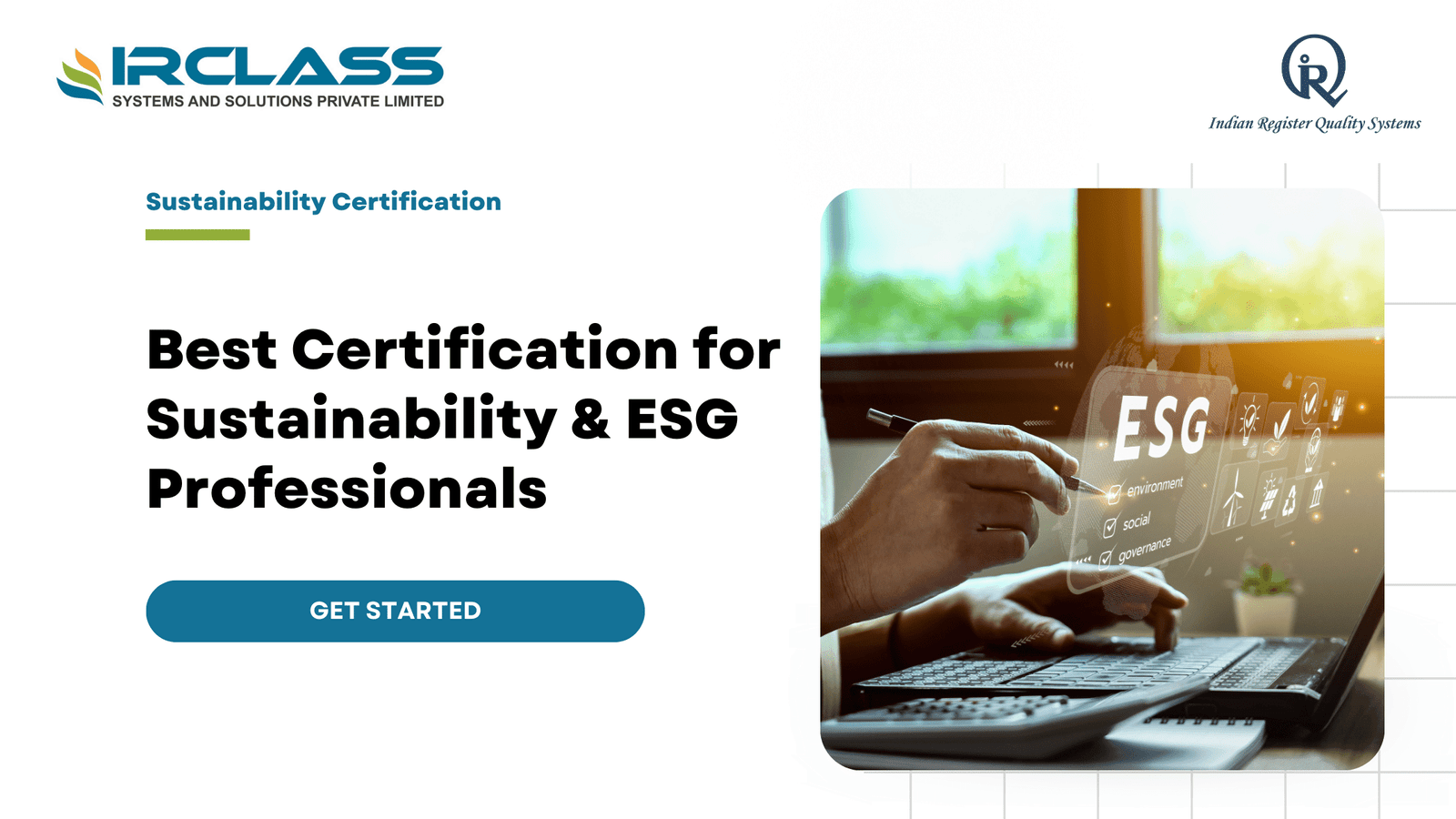
What’s the Best Certification for Sustainability & ESG Professionals
Sustainability and ESG are no longer optional. Shareholders, regulators, and consumers want companies to report on their effects on the environment, society, and governance. To meet these demands, businesses need experts who are conversant with ESG frameworks, reporting standards, and compliance. Certifications render these professionals relevant and credible. Sustainability and ESG have many certifications. Some are strategy-based, some are reporting-based, and others are audit-based or risk management-based. The decision to follow one or the other is based on your position, sector, and goals. The relevant certification will unlock the gateway to employment in ESG consulting, compliance, climate risk, and sustainability reporting. Why ESG and Sustainability Certifications Matter Companies need certified professionals because ESG reporting is complex. It involves understanding climate disclosures, sustainability risks, social impact, and governance frameworks. These frameworks differ by region and regulation. Certifications provide structure and help you show that you can handle this complexity. Certifications also build trust. When a company hires someone with a recognized credential, they know this person meets global standards. Whether it’s developing a net-zero strategy or conducting ESG audits, certifications prove your skills. Key Areas Covered by Most ESG Certifications While each certification has its own focus, most of them include: Some programs go deeper into one area. If you want to specialize in climate risk or ESG strategy, you need to pick a certification that aligns with that focus. What to Look for in a Good ESG Certification Not all certifications are the same. Some are better suited for entry-level professionals, while others are made for senior leaders. The delivery format, global recognition, and technical depth all matter. If you’re just starting out, look for a foundational course that explains the basics of ESG. If you’re already working in compliance or risk, you need something more technical, with case studies and standards training. If you’re in internal audit, choose a course with ESG assurance modules. You also want a program that updates content regularly. ESG is evolving. What was relevant last year may not meet today’s disclosure requirements. Make sure the certification includes the latest frameworks. Certifications That ESG Professionals Consider There are certifications focused on corporate sustainability, and others that go deeper into ESG investing, disclosure, and assurance. Some are global; some are region-specific. Some are accredited; others are not. Professionals working in listed companies or firms subject to sustainability reporting regulations usually prefer certifications that include frameworks like TCFD, GRI, and the EU CSRD. ISO-based certifications are a better fit for assurance and internal audit roles. These include training in risk-based approaches, sustainability audits, and data validation. Certifications linked to ISO standards are also widely accepted. They follow a globally recognized structure and often include practical audit training. How These Certifications Are Structured Most ESG certifications follow a modular structure. You start with basic concepts like sustainability, governance, and risk. Then you move into reporting frameworks. Finally, you may go through case studies or simulations. Some courses are online and self-paced. Others are classroom-based with live instruction. If you’re working full-time, online options with flexible schedules help. But if you need networking or peer learning, classroom training works better. Some programs include exams. Others require a project or a case study analysis. Choose based on how you prefer to learn and prove your skills. What Companies Expect from ESG-Certified Professionals Today, companies don’t just want general sustainability awareness. They want you to know specific frameworks. They want people who can read ESG data, build a report, and review it for errors. In an internal audit, they want people who can validate disclosures. In compliance, they want people who can map ESG risks to regulatory guidelines. Some roles demand sector-specific ESG knowledge. For example, energy companies want professionals trained in Scope 3 emissions reporting. Financial institutions want people who understand climate risk in investment portfolios. A good ESG certification prepares you for these specific demands. The Global Shift Toward Mandatory ESG Reporting Many countries now require ESG disclosures. The EU has already enforced the Corporate Sustainability Reporting Directive (CSRD). India has mandated Business Responsibility and Sustainability Reporting (BRSR) for top-listed companies. The U.S. is moving toward climate-related disclosures. Other countries are catching up fast. This means that additional companies must find ways to identify and disclose ESG threats. Certified professionals are in demand because they bring clarity into the reporting process. They know what to disclose and how to present it to the regulators and investors. How to Choose the Right Certification for You Selecting the proper certification is a matter of your objectives. To work in strategy, choose a course that teaches ESG leadership. If you want to audit ESG reports, consider an assurance-oriented program. If you are in operations, seek training that connects ESG to business operations. Ask yourself: Don’t just look at the brand name. Look at the syllabus. Look at the trainer profiles. See who recognizes the certification. Talk to people who’ve taken it. How ESG Certifications Help You Stay Ahead The ESG field is still new, and it’s growing fast. Companies are building teams for ESG strategy, compliance, risk, and audit. They want people with proof of skills. ESG certifications help you stand out in job applications. They also help you make better decisions if you’re already in a leadership role. Certifications show you’re serious about the field. They show you understand sustainability beyond buzzwords. They give you frameworks, tools, and language to work with legal teams, auditors, and investors. They also help you build confidence. When you’re asked to lead a sustainability project or respond to a regulatory inquiry, you know what to do. You don’t guess. Conclusion The most useful certification is the one that can help you address the actual ESG issues. You may be involved in climate disclosures, ESG audits, or sustainable procurement, and you need training that is practical and up to date. The certifications provided by IRQS are internationally accepted, ISO-aligned, and practical in real-life ESG application. When you are serious about a career in sustainability, then
Search
Useful Links
Recent Posts
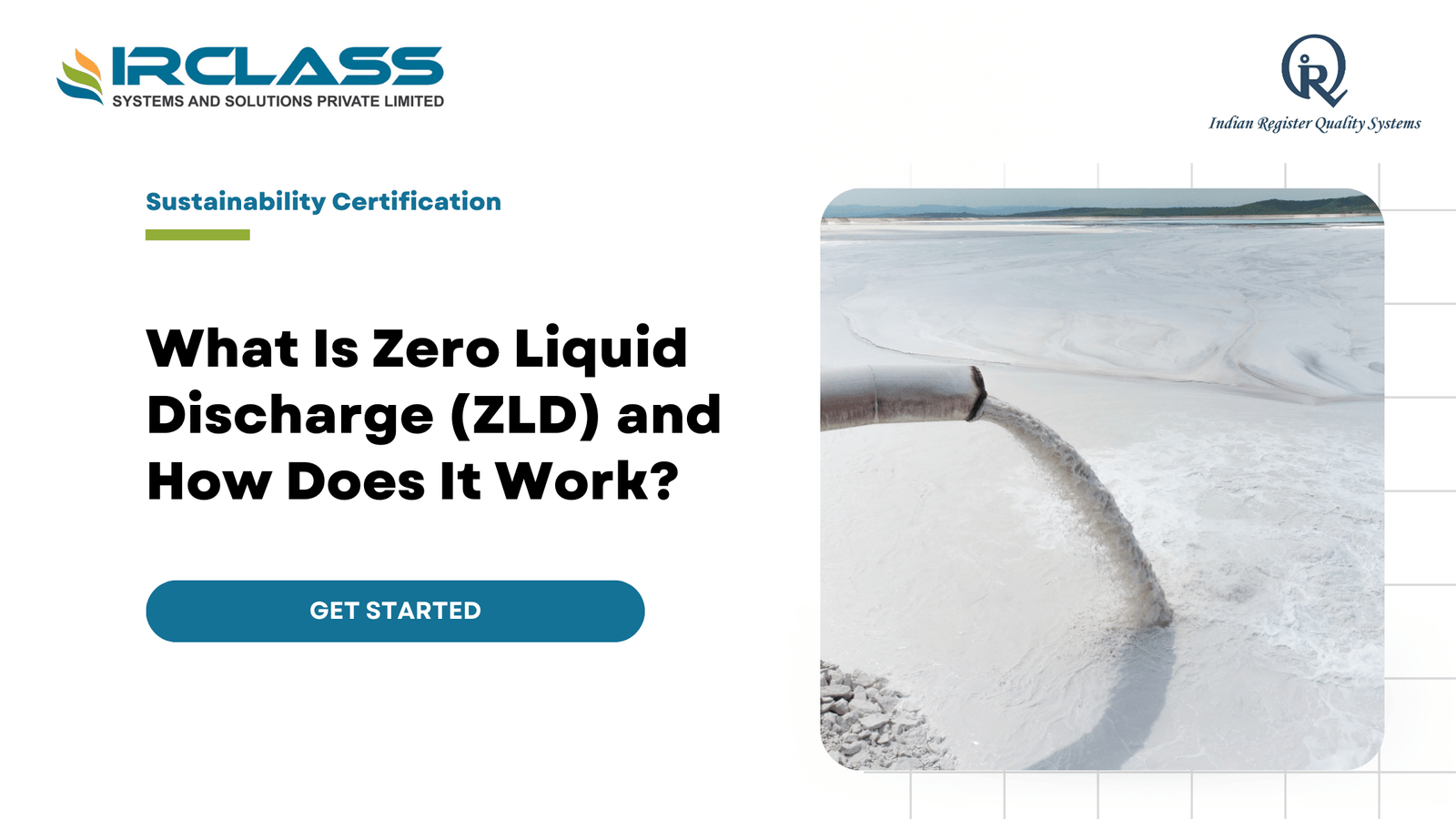
What Is Zero Liquid Discharge (ZLD) and How Does It Work?
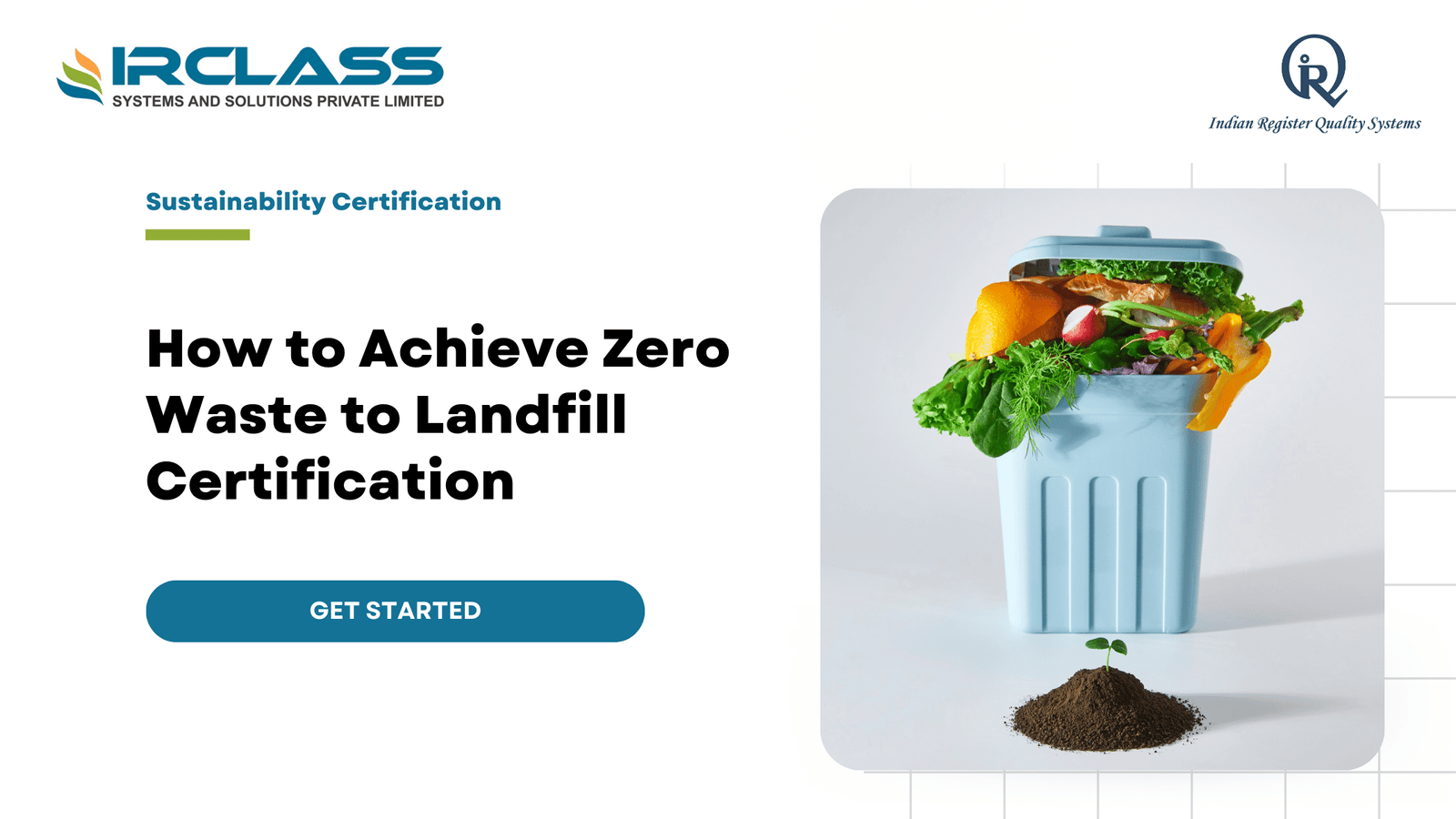
How to Achieve Zero Waste to Landfill Certification: Step-by-Step Guide
